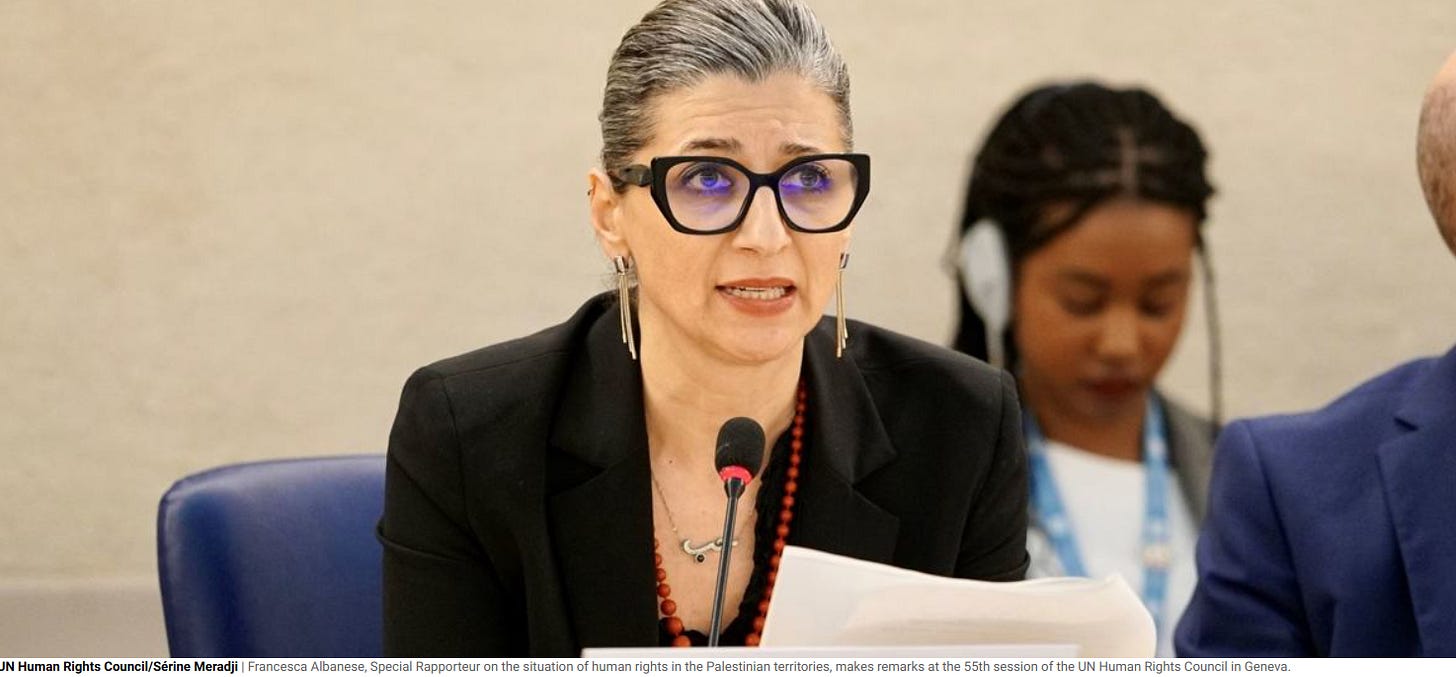People say what's happening in Gaza is merely ethnic cleansing. But ethnic cleansing is itself genocide.
These word games allow states to shirk responsibility.

During the press conference last week where Francesca Albanese, the United Nations Special Rapporteur to the Occupied Palestinian Territories, presented her findings that Israel is committing genocide in Gaza, an intrepid reporter asked her whether or not she had a document by any Israeli leaders or commanders that would be irrefutable proof of an intent to commit genocide.
The way the reporter phrased things, written documentation was an if-and-only-if situation, that the crime alleged could not be proven otherwise. This Albanese shot down with aplomb.
Reporter: Do you have a written document by the government with a clear intent to commit genocide?
Albanese: Do you think that in Rwanda, and in Bosnia Herzegovina, any government officials wrote a document saying, “I want to commit genocide”? Have you seen anything like that? I’ll answer this for you: No. It doesn’t work like that.
It’s interesting. I hear certain people object to the topic being brought up, simply because they don’t like the word ‘genocide’. British minister Andrew Mitchell recently said that he found the charge distasteful. (“Repulsive” is the word he chose.)
These people say these things as though the most important thing is to maintain a sense of high-tea cordiality. This is wrong. People are losing their lives; this is no time to stand on ceremony.
These people utter these objections as though it is impossible to discern intent in such a situation. “How do we know what’s in Netanyahu’s (or Smotrich’s, or Ben-Gvir’s) heart?” This type of hand-wringing ignores the fact that intent can be inferred. Indeed, intent in such situations is often determined by observing a pattern of behavior that, in its totality, indicates requisite intent.
It’s instructive that way back in October we got ahold of a document that was leaked, a white paper that revealed a plan to relocate or push Gazans out of the territory and into parts of Egypt.
When this white paper found its way into newspapers, Israel apologists and hawks downplayed the significance immediately. As often has happened in this conflict, apologists sought to associate what was revealed with a “lesser” crime. Sometimes, these warmongers look to tie a crime to being “just” a war crime or “just” a crime against humanity. (Remember, these are the same people who object to the word ‘genocide’ being used, because such a use would dilute the term. Same people.)
In this case, the objectors said that the white paper was merely evidence of a desire for ethnic cleansing. “Oh, that’s just ethnic cleansing. That’s not genocide. You need something other than that.” As though what the paper proposed was permissible.
The error those people committed was in assuming that one crime precludes the other, that they’re mutually exclusive. That’s not the case.
Indeed, the term ‘ethnic cleansing’, an extreme euphemism, was coined to make genocide more palatable. Hikmet Karčić, author of Torture, Humiliate, Kill: Inside the Bosnian Serb Camp System (2022), speaks to this preference of terminology amongst some:
Clearly the term “ethnic cleansing” is well- established and has proven to be a popular substitution for the word “genocide.” During the early 1990s, with genocides unfolding in Rwanda and Bosnia and Herzegovina, international politicians figured out that the phrase was a useful replacement for “genocide.” Using the “g- word” obliges international preventive intervention, while “ethnic cleansing” was a useful and at the time ill- defined neologism that sound[ed] vaguely terrible but did not amount to an admission of a need to intervene.
Despite being used frequently in [UN Security Council] and [UN General Assembly] resolutions, the term still lacks any formal definition, and it is not defined separately as a crime.1
Karčić corrects the record and informs us that ethnic cleansing is genocidal and that its appearance is enough on its own to establish the crime:
During the [Bosnian] war, a UN commission of experts was set up to create a definition and eventually settled on the following: “a purposeful policy designed by one ethnic or religious group to remove by violent and terror- inspiring means the civilian population of another ethnic or religious group from certain geographic areas.” The commission observed that ethnic cleansing comprised, amidst a range of other things, confinement of a civilian population, rape, murder, torture, and forcible removal of said population. Crucially, it also observed that such acts could fall within the meaning of the Genocide Convention. The legal possibility exists in that “forcibly transferring an ethnic group from a region effectively destroys the ethnic group, and desiring ethnic homogeneity is equivalent to denying an ethnic group the right to exist.”2
So we see that ethnic cleansing is genocidal intent made manifest.
This is important to keep in mind, particularly in the case of Israel, where we see this white paper proposal paired with actions on the ground that align with the plan’s objectives. We see the corralling of civilians into one corridor. We see them being squeezed onto smaller and smaller parcels of land with the idea being that living in such conditions would become so intolerable that the people will flee to the other side of the Egyptian border.
This is so much the case that Egyptian officials have built a temporary structure to receive a sudden influx of persons. Clearly, they are anticipating.
And that’s just the tip of the iceberg (a phrase Francesca Albanese herself reprised when describing her report to the pedant of a reporter). That’s just one aspect of the entirety of actions that Israel has taken to bring about what at least one Israeli official has termed the “Gaza Nakba.”
It’s in that totality that it becomes clear that the state of Israel has not only the requisite intent (dolus specialis) but also that they’ve engaged in the implementation of that intent.
When American officials and their spokespersons come to a podium and say that they are not aware or that they have not found Israel to be in contravention of international law, we must remember that they are doing their damnedest to not admit that Israel is committing genocide, because that would obligate them to intervene. It’s clear that, for whatever reason, the U.S. is not interested in putting a halt to Israel’s intentions. So they pirouette with euphemisms. The Biden administration seems to be recapitulating lessons from the George HW Bush era, where
“‘the pictures from the camps [in Bosnia] thus confronted Bush officials with the challenge not of how to deal with the reemergence of concentration camps in Europe but rather how to withstand the political pressures from the televised images of them.’”3
David Campbell, who revived the quote above by Mark Danner in his essay “Atrocity, memory, photography” for the Journal of Human Rights in 2002, added:
As a result, the Bush administration, and later the Clinton administration, went to great lengths to avoid describing the Bosnian war as genocide. The policy initiatives that sprang forth in August 1992 testified to the way US strategic doctrine serves to delay for as long as possible sending in the troops; indeed, both the Bush and Clinton administrations consistently stressed there would be no military deployment until a peace deal had been agreed by all parties.4
It seems the Biden administration has taken up the guise, except this time it has stressed that there will be no ceasefire until negotiations are complete. Biden and his officials have turned the idea of peacekeeping on its head. He and his have been a midwife to this genocide.
It took Biden & Co. months to get around to saying the word ‘ceasefire’ at all, so it may be some time before we see anyone from the administration take up the discussion of genocide in all seriousness. However, those of us observing the situation are not restricted to their limited use of language. We see the evidence of intent to scour the area of Palestinians; and we understand the reluctance the U.S. is displaying, for logistical reasons.
Israel and the U.S. are a team. We must recognize this. And, at this point, they are trying to play us one against the other. In many ways, they are playing bad cop, worse cop. If we can understand this, we can begin to put their otherwise inscrutable actions in proper perspective.
Hikmet Karčić, Torture, Humiliate, Kill: Inside the Bosnian Serb Camp System (2022), p. 40. University of Michigan Press.
Karčić, ibid., pp. 40-41, emphases added.
Mark Danner, as quoted by David Campbell, “Atrocity, memory, photography: Imaging the concentration camps of Bosnia – the case of ITN versus Living Marxism, Part 2,” Journal of Human Rights (2002), Vol. 1, No. 2, p. 157. Emphasis added.
Campbell, ibid. Emphasis added.





Thank you for this important and clarifying post. It's genocide.
Again - you are lost. Genocide is when you kill people simply because you do not believe they have a right to exist. In the middle of military attacks and security threats it is virtually impossible to establish genocide. I understand that these Quip answers given by Humanitarian Idealists seem so clever but they are meaningless. In the midst of a security threat conflict unless you have statements from top Israeli leaders articulating that security is established and is no longer an issue AND they desire to wipe out the rest of the Palestinians for Good Fun - You have No GENOCIDE!